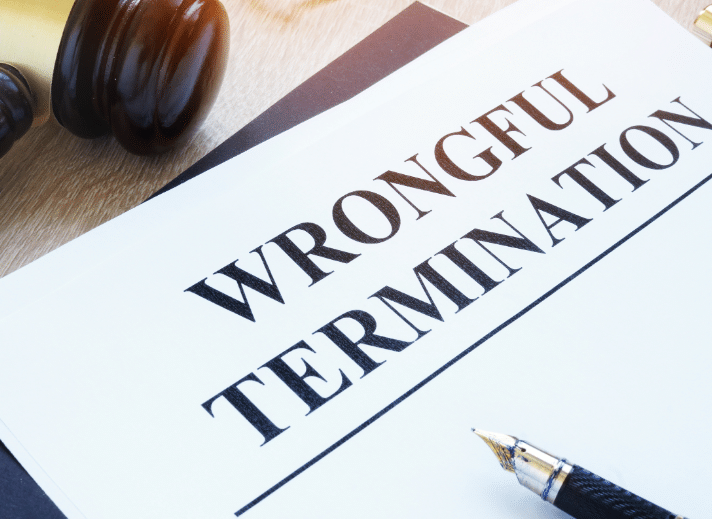
The Fee Is Free Unless You Win.
Top Rated Employment Law Firm
Protecting Families Since 1995
$450 Million Won
TABLE OF CONTENTS
Wrongful termination in New Jersey is when an employee is fired or terminated for an illegal reason that goes against the laws in place or public policy. While New Jersey is an at-will state for employment, the laws are very clear that an employee cannot be fired or terminated for a reason that breaks the laws. For the past 25 years, the experienced attorneys at the Derek Smith Law Group have helped employees who are the victims of wrongful termination get the compensation they deserve.
Wrongful termination in New Jersey occurs when an employee is fired or terminated for a reason that goes against the law. This can include issues, such as discrimination, retaliation, or reasons that go against public policy. Reasons a termination can be illegal include:
Several different forms can help prove wrongful termination considering there are several reasons and categories in which wrongful termination can exist.

An implied contract could be that an employee handbook states that an employee can only be fired for just cause. This means that that employer is no longer an at-will employer and cannot fire someone just because he wants to, as long as it is legal. A copy of the handbook or contract as evidence to support the termination was wrong and against the law.
New Jersey is an at-will employment state. This means that an employer can hire or fire an employee for almost any reason. Of course, it the reason breaks the law, the employer is not protected under the laws provided by an at-will employment state. Some examples of wrongful termination in New Jersey include:
Depending on your claim, your statute of limitations will vary. In New Jersey, if you have a wrongful termination based on discrimination, they may file a claim with the Equal Employment Opportunity Commission (EEOC) within 300 days of the termination. If you choose, instead to file a claim under the New Jersey Law Against Discrimination (NJLAD), you are allowed a 2-year time limit to file your claim for wrongful termination or retaliation.
If you are filing a claim under NJLAD for whistleblower retaliation, you only have 1 year to file your lawsuit.
If your claim is for breach of contract, whether verbal or written, you have a 6-year time limit to file your lawsuit, unless your contract specifies differently.
Finally, if you were fired because you refused to breach public policy or you were defamed as a result, you have a 3-year statute of limitations to file your wrongful termination claim.
As a victim of wrongful termination in New Jersey, you are entitled to seek justice. The court will often award some, if not all, of the following remedies:
Discover how our expertise has helped clients overcome their legal challenges and achieve successful outcomes.
View All TestimonialsOlivia is the best! Oliva was very thorough, patient, and very detailed and descriptive regarding the process. She was very supportive of my sexual harassment case. From the very beginning, she communicated and would provide me with any updates and she was always available when I needed anything. More importantly, she always extended that comfort level of trust which always made me feel at peac... Read Full Testimonial
Casey Barkhordarian is a fabulous attorney to work with. He explained everything to me about the case (including the millions of questions I asked) right from the start of our very first meeting. He did so in a way that I could understand and was very prompt and clear with communication the entire time. Casey Barkhordarian is a very competent and knowledgeable lawyer to have on your team. I def... Read Full Testimonial
Matt Finkleberg is by far the best attorney I’ve ever hired! From the outset, it was evident that he was not just another lawyer; Matt is nothing short of extraordinary. He possesses the ability to do his job phenomenally while somehow managing to give me hope during one of my darkest of hours. Matt consistently returned my calls promptly, regardless of my questions, confusion, or self-doubt ... Read Full Testimonial
I cannot speak highly enough about my experience working with Matt Finkelberg. From the very beginning, Matt approached my case with an incredible level of professionalism, knowledge, and dedication that immediately put me at ease. It is rare to find an attorney who not only possesses an impressive depth of legal expertise but who also truly cares about the well-being and best interests of thei... Read Full Testimonial
Olivia is absolutely outstanding! She understands the emotional side of your case while being able to find the legal aspects of holding the employer accountable for breaking the law! Made a really terrible situation a little easier by explaining everything and helping me get everything in order and in the right hands. I would not use anyone else! Call them for any sexual harassment case... You ... Read Full Testimonial
This law firm is absolutely amazing!!! They went so above and beyond for me!!! I am so grateful for all their help with my difficult case!!! If you need a lawyer, you will be in great hands with their firm!!! And wait until you see the office! The building is so high tech I couldn't figure out how to get in the elevator lol!
It was a pleasure to have Casey represent and help me for my employment case. It was my first time needing an attorney, so I was a bit apprehensive at first – Casey took the time to answer all of my questions and fully explain everything to me, which really put me at ease. He was very attentive, supportive, and knowledgeable throughout the whole process – Casey would ask questions to ensure... Read Full Testimonial
matt is an excellent attorney. he handled my case with the utmost care and highly exceeded all expectations. i could not recommend derek smith and esp. matt finkelberg enough
matt is an excellent attorney. he handled my case with the utmost care and highly exceeded all expectations. i could not recommend derek smith and esp. matt finkelberg enough 🙂
Matt handled a suit against the City of LA and members of the a Neighborhood Council for racial discrimination and harassment. Ths was the first suit of this type filed on a Neighborhood Council Matt handled it with poise and above all professionalism. He walked me through the 3 year process and above all provided moral support and encouragement as I still experienced racism and harassment duri... Read Full Testimonial
Matt Finkelberg is Amazing and Devotional! It was a pleasure to have Matt represent me for my employment case. He was very attentive, supportive, and knowledgable throughout the whole process. Whenever I reached out he responded promptly which I greatly appreciated. Matt fought diligently and hard throughout my case to make sure my case was represented best. Thank you again Matt for everything.... Read Full Testimonial
It was a pleasure to have Casey represent and help me for my employment case. It was my first time needing an attorney, so I was a bit apprehensive at first – Casey took the time to answer all of my questions and fully explain everything to me, which really put me at ease. He was very attentive, supportive, and knowledgeable throughout the whole process – Casey would ask questions to ensure... Read Full Testimonial
Our dedicated attorneys are ready to fight for your workplace rights and ensure justice!
Even in an at-will employment state, you deserve to know that you cannot be judged and fired because you are part of a protected class or choose to do the right thing.
If you are the victim of wrongful termination in New Jersey, the experienced attorneys at the Derek Smith Law Group can help.
Contact us today at (973) 388-8625 for your free consultation. We do not collect any money until you win your case.

Our experienced legal team provides reliable services in key U.S. cities, ensuring expert assistance for workplace discrimination and employment law matters wherever you are located.